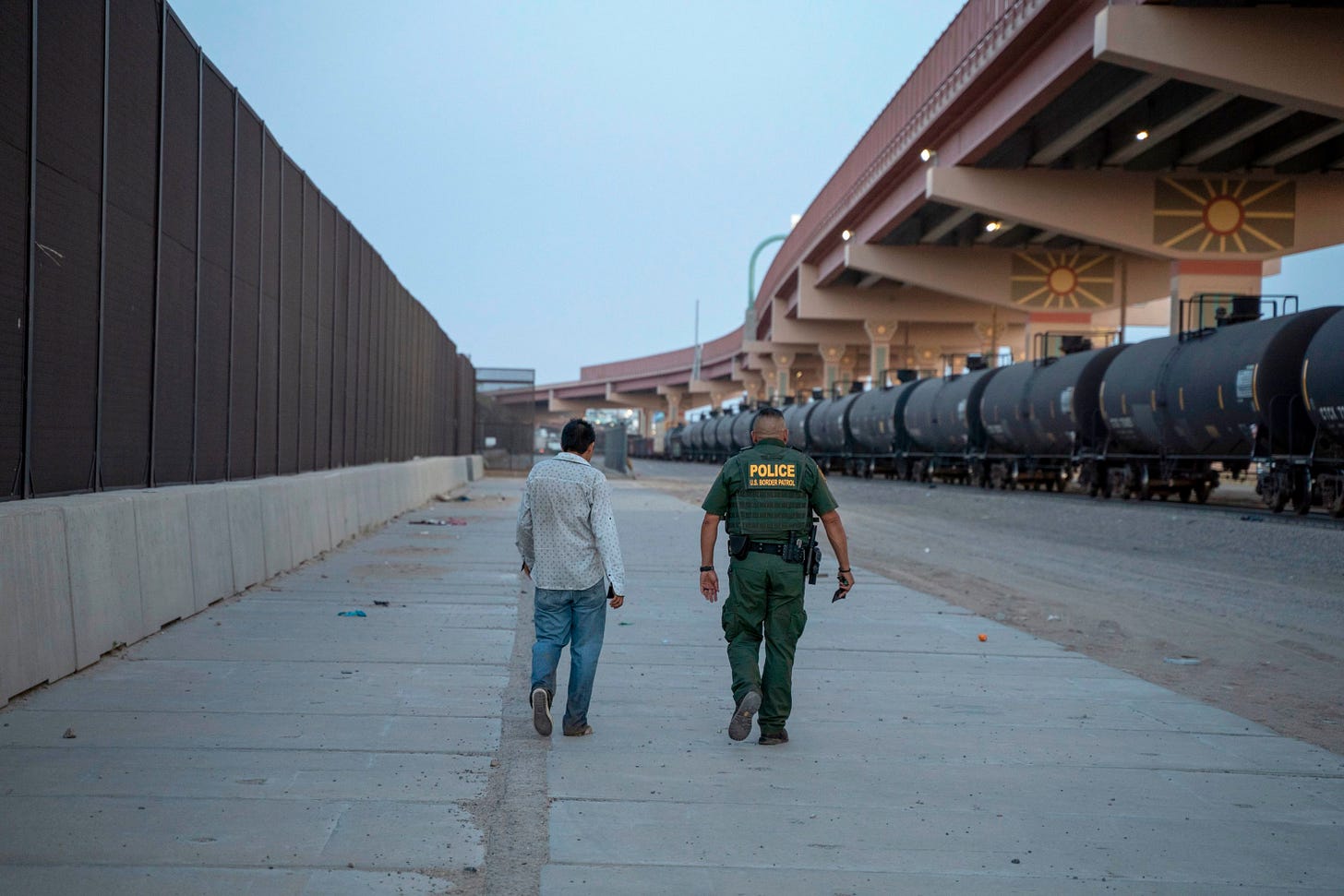Don’t Debate Immigration on Trump’s Terms
They distort the moral and political realities of the issue.

Donald Trump tried for four years to convince America there was a crisis at the U.S. southern border, so that he—along with his chief racist zealot Stephen Miller—could effectively close our borders to anyone but white people. Trump’s promise to build a border wall helped get him elected in 2016. (To quote an undocumented worker I interviewed last year, “Anyone who thinks building a wall will solve this problem never saw a ladder.”) And immigration remained an important issue for his base in last year’s election.
Trump so effectively framed the argument about the border that even today, many journalists still report on a “crisis” that doesn’t exist. What we have at the border is a monumental Trump screw-up regarding a decades-long problem—a screw-up that the Biden administration is trying to undo.
The problem begins in Latin and South America where governments and infrastructure are failing, problems exacerbated in some cases by actions of our own government and private companies. In a White House briefing last week, Roberta Jacobson, a former U.S. ambassador to Mexico who is now the Biden administration’s coordinator for the southern border, announced that “the border is not open”—but stressed that the administration will work with civil-society groups and nonprofit organizations to try and help those in distressed countries because some governments cannot be trusted. That’s a step in the right direction. Some governments south of the border are too corrupt to deal with directly. Any money sent their way will, as has happened in the past, simply disappear.
I first stepped foot outside of the United States to cover these issues 35 years ago. We did have a crisis then. The Mexican oil economy had crashed, the peso was devalued, and each day saw thousands of families trying to relocate to the United States, hoping for any kind of work and better pay. Then, as now, there was seasonal work for agricultural, construction, and other workers—and that added to the numbers. Before the Simpson-Mazzoli Act in 1986, it was illegal for these workers to come across the border without visas but not illegal for American companies to hire them. Today some companies still hire undocumented workers, often without consequence.
The international demand for cocaine and other illegal drugs has emboldened and empowered violent drug cartels, further making certain areas south of the border unlivable. So desperate are parents to get their children away from the murder, mayhem, and drugs that many, instead of traveling with their children, now simply try to get them across the border—hoping they’ll have better lives. Hence part of the reason for the influx of undocumented minors.
These people have nothing. Some live in homes made out of hammered-flat tin-can walls, or of cardboard with packing crates as floors and ceilings. Some have less than that.
I’ve spent time with many of these immigrants over the years. I’ve gotten to know them. I’ve seen how they were victimized at home, by their governments, the drug cartels, and the “coyotes” who took their life savings to smuggle them across borders. Some of those I met had friends and loved ones who died making horrifying trips—often by foot—hundreds or thousands of miles to reach the United States. Their goal was to become Americans. I defy anyone to spend any time with these people, talk with them and get to know them—and spend some time as Atticus Finch advised, walking around in their shoes—and come away with anything but a sense of despair and compassion when you consider their plight.
Republicans once understood this. Ronald Reagan, George H.W. Bush, and George W. Bush all supported law and order, but they all supported pathways to citizenship for undocumented immigrants. We have a moral obligation to assist them—and a humanitarian obligation and self-interest concerns to help guide their governments down better paths.
On immigration, the biggest problem the Biden administration faces is letting the issue be framed in Donald Trump’s terms. Biden should allow reporters see what is going on in the Carrizo Springs, Texas detention center—where a small delegation of the administration visited earlier this month but didn’t tell anyone until after the fact. That mistake allowed members of the media to question what Biden was hiding. And we did. Reporters should also get off their rumps and spend a lot of time on the border.
We continue to act like the southern border of the United States is a different country—hard to understand and deal with. Pick up a phone and call the mayors in Laredo, McAllen, El Paso, San Diego. Ask them what will work. Ask the police chiefs, some of whom still have family members living in Mexico, what the real problem is. Listen to the members of Congress who still live near the border. Everyone I’ve talked to down there in the year since I last traveled to the border appreciates the changes the Biden administration has made. They tell me the administration listens. But they are also concerned that President Biden and his team “still don’t get it.”
Put simply: Donald Trump, who routinely demonized undocumented immigrants, calling them drug dealers, criminals, and rapists, should not be allowed to frame this issue. Nor should anyone whose interests are in keeping the status quo so cheap labor can be provided to American companies. Nor should the racists who believe that the people seeking asylum from a situation we helped to create are less human than we are.
The people coming here, in whatever numbers, are a symptom, not a cause.
The sooner the Biden administration understands that, and reframes the issue based in reality rather than in Trump’s dramatic and self-serving terms, the better.



